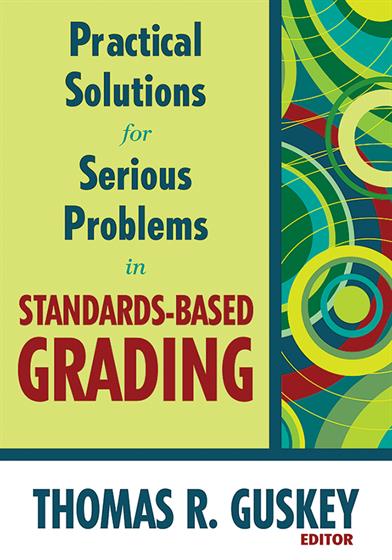1. Introduction
The Difficulty of Change
Background and Format
Content Summary
Our Hope
References
2. Grading Policies That Work Against Standards...and How to Fix Them
Policy #1: Grading "On the Curve"
Policy #2: Selecting the Class Valedictorian
Policy #3: Using Grades as a Form of Punishment
Policy #4: Using Zeros in Grading
Policy #5: Hodgepodge Grading
Summary
References
3. The Challenges of Grading and Reporting in Special Education: An Inclusive Grading Model
Why Does Special Education Grading Matter?
Grading Adaptations
Implications of Standards-Based Grading
Inclusive Grading Model
Step 1: Determine If Accomodations or Modifications Are Needed
Step 2: Establish Standards for Modified Areas
Step 3: Determine the Need for Additional Goals
Step 4: Apply Equivalent Grading Practices to Appropriate Standards
Step 5: Communicate the Meaning of the Grades
Summary
References
4. Assigning Fair, Accurate, and Meaningful Grades to Students Who Are English Language Learners
Challenges of Grading Students Who Are English Language Learners
Special Considerations
Accommodations
Modifications
Current Research and Knowledge Base
Recommendations for Effective Communication
Implications for Educational Policy and Practice
Steps Toward Better Practice
Communication
Reflection
References
5. Legal Issues of Grading in the Era of High-Stakes Accountability
Current Research and Knowledge Base
What Is a Grade and Who Assigns It?
Students and Legal Issues in Grading
Due Process and Equal Protection
Grade Reductions
Confidentiality
Teachers and Legal Issues in Grading
First Amendment
Liability
Implications for Policy and Practice
Confidentiality
Grade Penalties
Appeals Policies and Due Process
Educator Responsibilities
Recommendations for Improvement
References
Appendix
6. Fostering Consistency Between Standards-Based Grades and Large-Scale Assessment Results
Description of the Problem
Overview of Standards-Based Grading in the District
Understanding Teachers' Assessment Styles
Assessing Most Standards
Grading on Achievement, Not Effort
Creating or Borrowing Assessments to Supplement Text-Provided Tests
Tracking Performance Skill-by-Skill
Focusing on Attainment of Standards Instead of the District Text
Grading With End-of-Unit Assessments
Other Grading Strategies
Focus on Overall Achievement
Frequency of Assessment for Grading Purposes
Multiple Assessment Approaches
Clear Grading Methods
Implications
Changes in Report Card Format
Organizing for Standards-Based Grading
Lack of Alignment Between District-Adopted Texts and State Standards
Skepticism From Parents and Teachers
Recommendations
Approaches to Organizing Grade Books
Using Diagnostic, Formative, and Summative Assessments
Separating Content Area Grades From Effort
Selecting a Method for Computing Grades
Differentiate Teaching to the Standards From Teaching to the Assessment
References
7. Synthesis of Issues and Implications
Current Grading Practices
Key Role of Teacher Judgment
The Fundamental Purpose of Standards-Based Grading
Validity of Standards-Based Grading
Fairness in Standards-Based Grading
Standards-Based Grading and Student Motivation
Student Standards-Based Self-Grading
Standards-Based Grading and Feedback
Where Do We Go From Here?
References
Index



